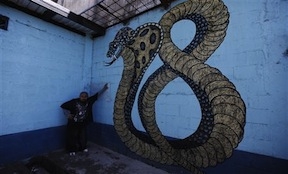Honduras local crime syndicates, like Barrio 18 and the Chirizos gang, are growing in sophistication thanks in part to the presence of transnational organized crime and the nation’s position as one of the principal handover points for cocaine shipments.
According to anonymous law enforcement sources consulted by El Heraldo, recent investigations have provided authorities with information on the increasing professionalization of both the Barrio 18 and the Chirizos gang.
The Barrio 18 reportedly counts lawyers, architects, and engineers among its members, and employs its own medical team. The architects and engineers are allegedly responsible for choosing houses the gang can use for operations — whose rightful owners are summarily forced to leave — and remodeling prison cells to make them more comfortable for incarcerated members, which in the case of members with children includes the construction of play areas.
The Chirizos also allegedly rely on professionals to facilitate illegal activities, including the management of the group’s finances. The gang — whose members mainly started out as lookouts and drug couriers for other criminal groups — has allegedly become a major player in the city of Comayaguela under the patronage of drug trafficking organizations. According to investigations, the Chirizos rely mainly on extortion, drug sales and assassination services to generate revenue, and help their patrons launder money through a variety of commercial activities.
InSight Crime Analysis
Numerous countries in the region have seen transnational criminal organizations facilitate the growth and sophistication of local criminal groups, often by hiring them to guard and transport drug shipments or carry out targeted assassinations, as well as by spurring the growth of a domestic drug market.
This appears to be the case in Honduras, which has become a major transit nation for drug shipments following a 2009 coup that weakened the state’s ability to fight crime. An estimated 140 to 300 tons of cocaine pass through the country annually, and according to 2012 US State Department estimates, 75 percent of all drug flights heading north from South America use Honduras as an air bridge.
SEE ALSO: Barrio 18 Profile
As a result of increased drug trafficking activity, Honduras has seen powerful transnational organizations like Mexico’s Zetas and Sinaloa Cartel establish a presence in the country. In addition to spurring the development of local criminal groups, transnational syndicates have contributed to the country’s elevated murder rate, which 2012 figures indicated was the highest of any country in the world outside a war zone.

